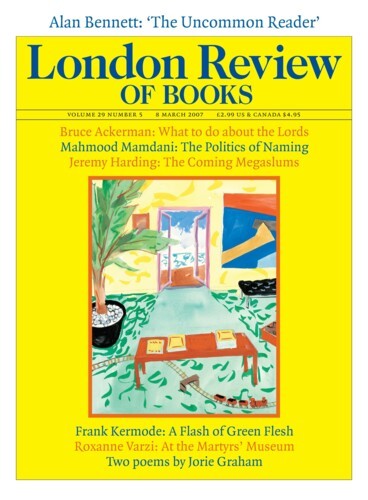Edith Wharton’s characters are always getting into trouble at the theatre. In The Age of Innocence, it’s the place where Newland Archer first meets the disgraced Countess Olenska (and is mortified, because everyone sees her in his fiancée’s box), and where, during a production of Boucicault’s The Shaughraun, he’s drawn to her. There are rules, of course, unwritten ones, acknowledged only when broken, about how to arrive (‘in a Brown coupé was almost as honourable a way of arriving as in one’s own carriage’) and when (‘it was “not the thing” to arrive early’). A woman, married or unmarried, must go with a suitable companion or not go at all: ‘One knew what to make of a woman who was “alone at the opera”.’ In The Custom of the Country, the parvenue Undine Spragg, who loves the theatre, persuades her father to rent her a night’s use of a box, but society makes her nervous, and she becomes ‘no longer capable of following the action on the stage’.
So it was with me. Hermione Lee’s biography of Edith Wharton was published on 1 February. On 2 February, I sat behind Professor Lee to watch Happy Days at the National. In Wharton’s story ‘His Father’s Son’, a man stealthily purchases, ‘under the shadow of the balcony, a stall whence he could observe the Bankshire box without fear of detection’; my proximity had happened by chance. My seat was P19 to Professor Lee’s N20 or N21, not sufficiently close to whisper a greeting, but close enough to offer one if I raised my voice. Only I couldn’t raise my voice. It would sound strident, be gauche and conspicuous: ‘Yoo-hoo, Hermione!’ I tried to catch her eye so as to bestow a little smile. A wave, a small one, wouldn’t be inappropriate, I decided – she had supervised my graduate thesis – and I permitted myself a coughing fit. But she still hadn’t seen me before, tout bonnement, up went the curtain.
I worried: what if she had seen me, and thought my failure to acknowledge her rude? I certainly didn’t want to bother her, but perhaps I should make an approach at the intermission? Talking during performances is perfectly comme il faut in Wharton – why else go to a show if not to talk to one’s friends? – so while Miss Shaw, up to her bosom in dirt, went on about existence, I asked my female companion for advice. My female companion said: ‘Shut up.’
These are not the easiest of times to be an American abroad, and for one brought up on 19th and early 20th-century Anglo-American novels, and little else, how could a move to England not induce all manner of anxieties? One lives in fear of appearing stupid and vulgar, pushy and ungrateful, of being grouped with those whom the ever correct Mrs Costello, in ‘Daisy Miller’, calls the ‘sort of Americans that one does one’s duty by not – not accepting’. And then there’s the edifying fate of Daisy Miller herself. When the American girl, in her ‘indestructible innocence, her invulnerable new-worldliness’, encounters the Old World, she is most probably doomed. Before I left America for graduate school, the professor who taught me James, noticing that my scholarship would pay for the support of a dependent spouse, told me to beware of fortune-hunters. I think she was kidding, but a Jamesian truth was perhaps not so far to seek: it was widely rumoured at Oxford that admissions standards for foreign students, who pay tuition up to five times the rate of home students, were increasingly lax. According to a recent Guardian report, to prevent a revenue shortfall British universities have budgeted for the number of foreign students to increase by 20 per cent within the next three years. They wanted us for our money.
For myself, I couldn’t help hoping for at least a little preying. ‘Scarcely a day passes that a foreigner, usually of distinction, doesn’t select an American bride,’ James wrote in ‘The Point of View’. For all her faults, the American girl is usually considered particularly pretty, or at least well-dressed, and she’s energetic enough to capture a European husband, if not sufficiently interesting to keep him. Yet I longed – as Isabel longs, in The Duke’s Children – to ‘walk out of our republic into your aristocracy with my head erect, with the Stars and Stripes waving proudly round me’.
But sedulous adherence to etiquette alone won’t provide entry. In Wharton’s final, unfinished novel, The Buccaneers, the ‘perfectly behaved Americans who are afraid of using even a wrong word’ are just as tiresome – and in their own way, just as vulgar – as any of their compatriots. At the theatre, I was supposed to take my cue from The Wings of the Dove. In the National Gallery, the American Milly Theale, unexpectedly encountering Merton Densher and Kate Croy, both of them English, ‘became as spontaneous as possible and as American as it might conveniently appeal to Mr Densher’, and invited the couple to lunch at her hotel: ‘She proposed it as the natural thing – proposed it as the American girl.’ It’s a matter of performance, of seeming to be natural – fresh, vigorous, uncorrupted – while never actually giving in to instinct. Milly, at the end of the novel, is completely refined, and quite dead.
Send Letters To:
The Editor
London Review of Books,
28 Little Russell Street
London, WC1A 2HN
letters@lrb.co.uk
Please include name, address, and a telephone number.

